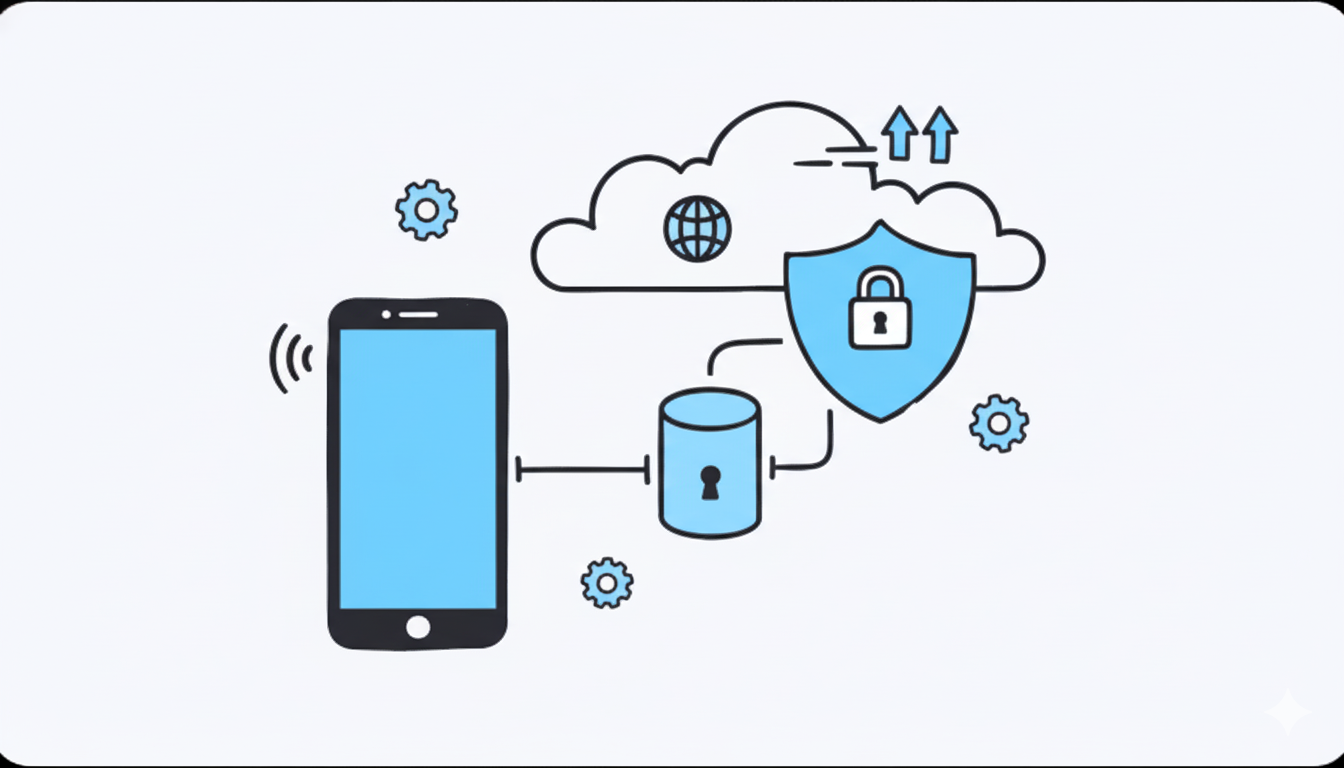.png)
VPN vs Proxy: Key Differences Explained for 2025

The battle for online privacy has never been more critical. With over 4.9 billion internet users globally, understanding how to protect your digital identity is essential. But here’s the twist: many people think proxies are enough. In reality, they only offer a superficial layer of security. That's because a VPN not only masks your IP address but also encrypts your entire internet traffic, shielding you from prying eyes. This substantial difference could redefine how you approach your online safety.
How a Proxy Server Works
A proxy server operates as a critical intermediary between users and the internet, functioning like a sophisticated digital gatekeeper that manages, filters, and routes network requests. Understanding its mechanics reveals a complex system designed to enhance security, privacy, and network performance.
The Core Mechanism of Proxy Request Handling
When a user sends a web request through a proxy server, the process involves multiple intricate steps. Initially, the client's request is intercepted by the proxy, which then evaluates and processes the request on behalf of the original client. Instead of connecting directly to the destination server, the request first travels through the proxy, which can modify, block, or forward the request based on predefined rules.
The proxy server replaces the client's original IP address with its own, effectively masking the user's true digital identity. Research from Cloudflare demonstrates that this mechanism allows users to bypass geographical restrictions and maintain a layer of anonymity while browsing.
Caching and Performance Optimization
Proxy servers are not merely passive conduits but active performance enhancers. By implementing intelligent caching mechanisms, proxies can store frequently accessed web content, dramatically reducing load times and network bandwidth consumption. According to a study from Pennsylvania State University, proxy caching can significantly improve network efficiency, though performance gains depend on specific network architectures.
The caching process works by storing copies of web resources temporarily. When subsequent requests for the same content arrive, the proxy can quickly retrieve the cached version instead of fetching it again from the original server. This approach reduces latency, minimizes redundant network traffic, and provides a smoother browsing experience for users.
Advanced Proxy Server Capabilities
Modern proxy servers extend far beyond basic request routing and caching. They incorporate sophisticated filtering mechanisms that can block malicious websites, restrict access to specific content categories, and provide granular control over network traffic. Research from University of Massachusetts highlights the concept of "composability" in proxy architectures, where different mechanisms can be dynamically combined to create customized services.
These advanced capabilities make proxy servers invaluable for organizations seeking robust network management. They can implement complex access policies, monitor network usage, enhance security by filtering potential threats, and provide detailed insights into internet usage patterns.
Key benefits of using proxy servers include:
- Enhanced Privacy: Masking original IP addresses
- Improved Performance: Intelligent content caching
- Security Filtering: Blocking malicious web resources
- Access Control: Managing network usage and restrictions
Understanding how proxy servers work reveals their critical role in modern network infrastructure, offering a sophisticated blend of performance optimization, security enhancement, and privacy protection.
How a VPN Operates Instead
A Virtual Private Network (VPN) represents a sophisticated technology that fundamentally transforms how users interact with the internet, providing a secure, encrypted pathway for digital communication. Unlike traditional network connections, VPNs create a protected tunnel that shields user data and identity from potential cyber threats.
Encryption and Secure Data Transmission
At the core of VPN functionality is an advanced encryption mechanism that transforms raw data into an unreadable format before transmission. Palo Alto Networks explains that this process involves creating a secure, encrypted tunnel between the user's device and a remote server, effectively rendering intercepted data meaningless to unauthorized parties.
The encryption process typically employs complex protocols like OpenVPN, IPSec, or WireGuard, which wrap each data packet in multiple layers of cryptographic protection. When data leaves the user's device, it's completely scrambled, ensuring that even if someone manages to intercept the transmission, they cannot decipher its contents without the specific decryption key.
Server Routing and IP Masking
VPNs fundamentally alter how network requests are routed by redirecting internet traffic through specialized remote servers located in different geographical regions. eSecurityPlanet highlights that this routing mechanism accomplishes two critical objectives: anonymizing the user's original IP address and bypassing geographical restrictions.
When a user connects to a VPN, their internet traffic is first sent to the VPN server, which then forwards the request to the intended destination. This process effectively masks the user's true location and digital identity, making it appear as though the request originates from the VPN server's location rather than the user's actual physical network.
Advanced Security and Compliance Protocols
Beyond basic encryption, modern VPNs incorporate sophisticated security frameworks designed to meet rigorous compliance standards. The National Institute of Standards and Technology (NIST) recommends implementing comprehensive technical, operational, and management controls to ensure robust VPN security.
These advanced VPN systems integrate multiple layers of protection, including:
- Multi-Factor Authentication: Requiring additional verification beyond passwords
- Kill Switch Mechanisms: Automatically disconnecting internet access if VPN connection drops
- Split Tunneling: Allowing selective routing of traffic through VPN
- Protocol Diversity: Supporting multiple encryption protocols
The comprehensive approach to network security demonstrates that VPNs are not merely tools for anonymity, but sophisticated systems designed to protect digital interactions across complex technological landscapes. By combining encryption, strategic routing, and advanced security protocols, VPNs provide users with a powerful mechanism for maintaining privacy and security in an increasingly interconnected digital world.
Key Differences: Privacy And Security
The landscape of online privacy and security is complex, with VPNs and proxies offering distinct approaches to protecting digital identities and data. Understanding their nuanced differences is crucial for users seeking comprehensive online protection.
Encryption And Comprehensive Protection
VPNs provide a superior level of digital security by implementing end-to-end encryption across all device traffic. Proxy-Cheap reveals that while proxies typically only mask IP addresses for specific applications, VPNs encrypt all data traversing between a user's device and the internet, creating a robust security barrier.
This comprehensive encryption means that VPNs protect all network communications, including emails, messaging apps, and background software operations. Proxies, in contrast, offer limited protection, functioning more like a digital disguise than a comprehensive security solution. The encryption difference is stark: VPN traffic becomes unreadable to potential interceptors, whereas proxy traffic remains potentially vulnerable.
Operational Scope And Anonymity
Froxy's research highlights a critical distinction in operational architecture. VPNs operate at the operating system level, providing system-wide protection and anonymity. Proxies, however, function at the application level, meaning their protection is limited to specific web browsers or applications.
This architectural difference translates into significant real-world implications. A VPN secures all device traffic, including background apps and system processes, while a proxy only redirects traffic from a single application. For users requiring comprehensive digital privacy—such as journalists, remote workers, or privacy-conscious individuals—this distinction is paramount.
Data Logging And Privacy Practices
Privacy practices represent another crucial differentiator between VPNs and proxies. Reputable VPN services often maintain strict no-logs policies, meaning they do not retain records that could trace online activities back to individual users. Proxies, conversely, frequently have less transparent logging practices.
Key privacy considerations include:
- VPN Advantages: Comprehensive encryption, system-wide protection, stringent no-logging policies
- Proxy Limitations: Application-specific masking, potential data logging, limited security
The choice between a VPN and a proxy depends on specific user requirements. For users demanding robust, comprehensive digital protection, VPNs offer a more sophisticated and secure solution. Proxies remain useful for specific, limited scenarios like bypassing regional content restrictions or basic IP masking.
Ultimately, understanding these nuanced differences empowers users to make informed decisions about their digital privacy and security strategies. The digital landscape continues to evolve, and staying informed about protection mechanisms is crucial in maintaining personal data integrity and online anonymity.
Choosing Between VPN And Proxy
Selecting the right digital privacy tool requires careful consideration of individual needs, security requirements, and specific online activities. Understanding the nuanced strengths and limitations of VPNs and proxies empowers users to make informed decisions about their digital protection strategy.
Performance And Speed Considerations
Proxies generally offer faster connection speeds and easier configuration, making them attractive for users primarily interested in bypassing website restrictions. Proxies create a more direct routing path, which translates to minimal latency and quicker data transmission.
However, speed should not be the sole determining factor. While proxies might provide marginally faster connections, they compromise on comprehensive security. Users engaged in sensitive online activities—such as financial transactions, confidential communications, or accessing restricted content—require more robust protection than mere IP masking.
Security And Privacy Requirements
VPN.com research emphasizes that for users prioritizing privacy and protection from cyber threats, VPNs emerge as the superior choice. VPNs deliver end-to-end encryption across all internet traffic, creating a secure tunnel that shields users' digital identities and data from potential interceptors.
Key security differentiators include:
- VPNs: Comprehensive encryption, system-wide protection
- Proxies: Application-specific IP masking, limited security
Most reputable VPN services enforce strict no-log policies, ensuring that user activities remain confidential. Proxies, in contrast, often maintain less transparent logging practices, potentially exposing user data to third-party scrutiny.
Use Case-Specific Selection
Optimal choice depends on specific user requirements. For individuals seeking basic geo-restriction bypassing or occasional anonymity, proxies might suffice. However, users demanding robust digital protection—including remote workers, journalists, or privacy-conscious professionals—should prioritize VPN solutions.
Consider these scenarios:
- Casual Browsing: Proxy might be adequate
- Sensitive Work: VPN is strongly recommended
- Streaming Geo-Restricted Content: Both can be effective
- Protecting Financial Transactions: VPN is essential
Beyond technical specifications, users should evaluate factors like budget, ease of use, server network diversity, and additional features such as multi-device support and kill switch mechanisms.
Ultimately, the VPN vs. proxy decision is not universal but deeply personal. By understanding individual digital interaction patterns, security needs, and performance expectations, users can select the most appropriate tool. In an increasingly complex digital landscape, informed choices about privacy tools are crucial for maintaining personal data integrity and online anonymity.


%20(91).png)
%20(90).png)
%20(90).png)
%20(89).png)
%20(88).png)
%20(87).png)
%20(86).png)
%20(85).png)
%20(84).png)
%20(83).png)
%20(82).png)
%20(81).png)
%20(80).png)
%20(79).png)
%20(78).png)
%20(77).png)
%20(76).png)
%20(75).png)
%20(74).png)
%20(73).png)
.png)
.png)
.png)
.png)
.png)
%20(72).png)
%20(70).png)
%20(68).png)
%20(66).png)
%20(64).png)
%20(63).png)
%20(62).png)
%20(60).png)
%20(59).png)
%20(58).png)
%20(57).png)
%20(52).png)
%20(51).png)
%20(49).png)
%20(48).png)
%20(46).png)
%20(45).png)
%20(44).png)
%20(43).png)
%20(42).png)
%20(41).png)
%20(40).png)
%20(37).png)
%20(36).png)
%20(35).png)
%20(33).png)
%20(32).png)
%20(30).png)
%20(29).png)
%20(27).png)
%20(26).png)
%20(25).png)
%20(24).png)
%20(22).png)
%20(21).png)
%20(20).png)
%20(19).png)
%20(18).png)
.svg)
%20(17).png)
%20(16).png)
%20(15).png)
%20(14).png)
%20(11).png)
%20(10).png)
%20(9).png)

%20(7).png)
%20(6).png)
%20(5).png)
%20(4).png)
%20(3).png)
%20(2).png)
.png)
.png)
%20(1).png)
.png)
.png)
.png)
.png)
.png)
.png)
.png)
.png)
.png)
.png)
.png)
.png)
.png)
.png)
.png)
.png)
.png)
.png)
.png)
